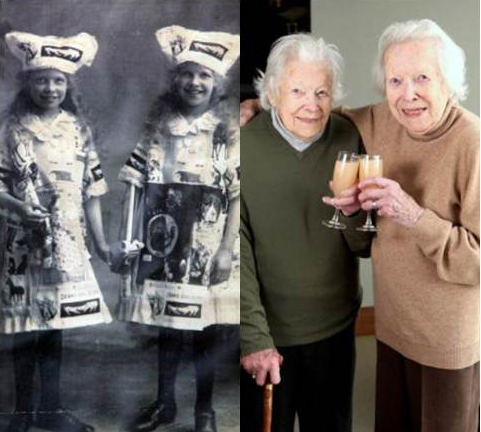Key genes that switch off with ageing identified

In a joint collaboration between King’s College London and the Wellcome Trust Sanger Institute, scientists have identified a group of ‘ageing’ genes that are switched on and off by natural mechanisms called epigenetic factors, influencing the rate of healthy ageing and potential longevity.
The team suggests that these epigenetic processes – that can be caused by external factors such as diet, lifestyle and environment – are likely to be initiated from an early age and continue through a person’s life. They say that the epigenetic changes they have identified could be used as potential ‘markers’ of biological ageing and in the future could be possible targets for anti-ageing therapies.
Published today in PLoS Genetics, the study looked at 172 twins aged 32 to 80 from the TwinsUK cohort based at King’s College London and St Thomas’ Hospital, as part of King’s Health Partners.
The team used epigenome-wide association to compare genetic variants between the sets of twins in relation to chronological age. They identified 490 age-related epigenetic changes. They also analysed genetic variants in age related traits and found epigenetic changes in four genes related to cholesterol, lung function and maternal longevity.
To try to identify when these epigenetic changes may be triggered, the researchers replicated the study in 44 sets of younger twins, aged 22 – 61 and found that many of the 490 age-related epigenetic changes were also present in this younger group.
This study indicates that age-related genetic variations occur throughout our life, many of which are initiated early in life. A small set of these variants may be responsible for mediating the environmental and genetic effects that lead to the physical effects of age.
“We found that epigenetic changes associate with age-related traits that have previously been used to define biological age.
“We identified many age-related epigenetic changes, but four seemed to impact the rate of healthy ageing and potential longevity and we can use these findings as potential markers of ageing. These results can help understand the biological mechanisms underlying healthy ageing and age-related disease, and future work will explore how environmental effects can affect these epigenetic changes.”
Dr Jordana Bell from King’s College London, who co-led the study
“Our study interrogated only a fraction of sites in the genome that carry such epigenetic changes; these initial findings support the need for a more comprehensive scan of epigenetic variation.”
Dr Panos Deloukas Co-leader of the study from the Wellcome Trust Sanger Institute
More information
Funding
This work was supported in part by the Wellcome Trust and the European Research Council.
Participating Centres
A list of all participating centres can be found in the paper.
Publications:
Selected websites
King's College London
King’s College London is one of the top 30 universities in the world (2011/12 QS World University Rankings), and the fourth oldest in England. A research-led university based in the heart of London, King’s has nearly 23,500 students (of whom more than 9,000 are graduate students) from nearly 140 countries, and some 6,000 employees. King’s is in the second phase of a £1 billion redevelopment programme which is transforming its estate.
King’s has an outstanding reputation for providing world-class teaching and cutting-edge research. In the 2008 Research Assessment Exercise for British universities, 23 departments were ranked in the top quartile of British universities; over half of our academic staff work in departments that are in the top 10 per cent in the UK in their field and can thus be classed as world leading. The College is in the top seven UK universities for research earnings and has an overall annual income of nearly £450 million.
King’s has a particularly distinguished reputation in the humanities, law, the sciences (including a wide range of health areas such as psychiatry, medicine, nursing and dentistry) and social sciences including international affairs. It has played a major role in many of the advances that have shaped modern life, such as the discovery of the structure of DNA and research that led to the development of radio, television, mobile phones and radar. It is the largest centre for the education of healthcare professionals in Europe; no university has more Medical Research Council Centres.
King’s College London and Guy’s and St Thomas’, King’s College Hospital and South London and Maudsley NHS Foundation Trusts are part of King’s Health Partners. King’s Health Partners Academic Health Sciences Centre (AHSC) is a pioneering global collaboration between one of the world’s leading research-led universities and three of London’s most successful NHS Foundation Trusts, including leading teaching hospitals and comprehensive mental health services.
The Wellcome Trust Sanger Institute
The Wellcome Trust Sanger Institute is one of the world’s leading genome centres. Through its ability to conduct research at scale, it is able to engage in bold and long-term exploratory projects that are designed to influence and empower medical science globally. Institute research findings, generated through its own research programmes and through its leading role in international consortia, are being used to develop new diagnostics and treatments for human disease.
The Wellcome Trust
The Wellcome Trust is a global charitable foundation dedicated to achieving extraordinary improvements in human and animal health. We support the brightest minds in biomedical research and the medical humanities. Our breadth of support includes public engagement, education and the application of research to improve health. We are independent of both political and commercial interests.


